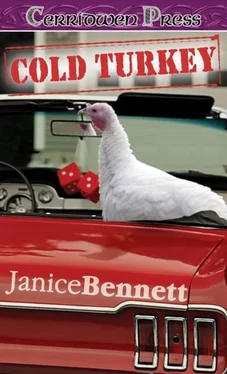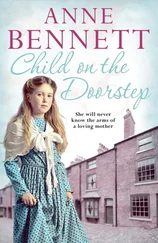Peggy slid her glasses down her pointed nose and peered at him over the top. “Why?”
Sarkisian closed his eyes for a pregnant moment. “Can’t anyone just answer a simple question around here? Did you hear or see anything?”
“Well,” Peggy pointed out kindly, “if I knew what you had in mind, it might help.”
“Someone murdered Clifford Brody in my study while I was out,” Gerda explained.
Sarkisian glared at her. “If you don’t mind, Ms. Lundquist…”
“I’m just trying to move things along. There’s no point in not telling her, is there?”
“Maybe you’d like to drive down the middle of your main street shouting it through my loudspeaker,” he suggested, exasperated.
“Why on earth would I want to do any such thing?” Gerda shot back, her expression far too innocent. “Really, don’t you think you ought to stop being so frivolous and set about finding out who murdered him? We’ve got a lot of things to take care of.”
Peggy, who had been staring open-mouthed at Gerda during this exchange, turned to me. “Is he really dead? Clifford Brody?” At my nod, Peggy’s wide mouth worked, as if she struggled to contain some strong emotion. Her control slipped, and for a fleeting moment she broke into a broad smile, which she mastered at once. With a suitably somber expression, she turned to the sheriff. “How terrible. Especially for Gerda. And Annike. Who did it?”
“He seems to think I did,” Gerda stuck in before Sarkisian could speak.
“I never said that!” the sheriff protested. “Damn it, I’m trying to find out-”
“Then why are you just standing there?” demanded Peggy. “For heaven’s sake, young man, what do you expect to accomplish if all you do is open doors for people?”
He started to speak, then closed his mouth again. “Next,” he finally said through gritted teeth, “I suppose you’re going to tell me how Tom McKinley would have had this murder solved by now.”
“Well, he certainly wouldn’t have wasted time suspecting Gerda,” Peggy pointed out.
The sheriff flushed. I watched in sympathy as his jaw clenched. Frustration seemed to radiate from every pore. Peggy frequently had that effect on people.
I turned a quelling glance at the little bird-like woman, only to surprise an odd expression in her eyes. Fear? Peggy? No, that had to be absurd. What had my aunt’s closest friend and neighbor to fear? Except possibly the same undisclosed worry that haunted Aunt Gerda?
“You want me to get on with the investigation?” Owen Sarkisian strode up to the table and glowered at all of us, indiscriminately. “Okay. Which of you ladies smokes?”
“Not in my house!” Gerda objected.
“Smokes?” I looked from my aunt to the sheriff, perplexed. “Why?”
“There’s a rather fancy lighter, a Navajo-design case of stamped silver with a chunk of turquoise, lying on the desk beside the body. But no smell of cigarettes, cigars, or smoke anywhere. Not on Brody, not in the room. So what’s it doing there?”
“Silver and turquoise…” Peggy’s voice trailed off. She fumbled at the strap that hung over her shoulder, dragged her cavernous hand-woven bag into her lap, unsnapped the top, and pawed through the contents. Slowly, her gaze rose to Gerda.
“I took it last time you were here,” Gerda said quickly.
Too quickly? I studied the set of my aunt’s features. I knew her expressions, could read them no matter how hard she tried to disguise them. I hadn’t a doubt she was lying.
“You took it?” Peggy blinked.
Gerda turned to the sheriff. “I’ve been trying to get her to quit smoking for years, now. Everyone in town knows that. Nothing’s worked so far, so I thought I’d try subtle means for a change. Like hiding her lighter, or her cigarettes. Make it more difficult for her.”
Owen Sarkisian looked from one to the other of them. “And when was she here last?”
“This afternoon,” Gerda said, at the same moment that Peggy announced, “Yesterday.”
“Yesterday,” Gerda corrected at once, while Peggy cried out, “This afternoon.”
“Yesterday?” Sarkisian jumped on Peggy’s first answer. “And you hadn’t noticed yet that your lighter was missing?”
“This afternoon,” Peggy repeated more firmly. “I-I forgot I’d come over.” Peggy cast a frantic glance at Gerda. “I do so often, you know. And I have other lighters, anyway.”
“You’ve been so busy, I don’t see how you could have noticed which lighter you were using,” Gerda stuck in, doggedly loyal.
“It’s been fun, though,” Peggy assured her. “I’m in charge of selling raffle tickets for the turkey drawing this year,” she explained to Sarkisian. From the depths of her bag she produced a rectangular booklet of printed orange strips of paper. “You haven’t bought any yet, have you, Sheriff?” she added, latching eagerly onto this new-and innocuous-topic. “It’s for a very good cause, you know. Our Service Club’s scholarship fund. And the prize is a smoked turkey, all ready for a buffet table. At least it was last year.”
“I told Cindy to go to the same place,” Gerda stuck in, readily abetting her friend in this diversion. “That’s the only detail she did take care of.”
“So how many do you want?” Peggy asked the sheriff.
“I don’t-”
“Of course you do. Everyone buys raffle tickets,” Peggy assured him. “One book or two? Or would you like to buy three?”
“I don’t want any. What did you do when you came over today?”
Peggy and Gerda exchanged glances, and it was Gerda who rushed into speech. “We were trying to figure out what still had to be done for our town’s Thanksgiving celebrations, of course. Our chairperson had just quit.”
Peggy, refusing to be diverted back to the real business of the hour, fixed Sarkisian with a look that put me uncomfortably in mind of my third grade teacher. “You should take three booklets, I think. After all, you are sheriff. You have to do something to support the community.” She fished two more of the orange books from her bag. “Two dollars for a book of five. That comes to a total of six dollars.” Her tone brooked no argument.
Apparently, Peggy’s look had the same effect on Sarkisian. Without saying a word, he fished in his back pocket, produced his wallet, and counted out the bills.
Peggy plucked these from his hand and presented him with the tickets. “Just deposit them in the fishbowl at the pancake breakfast on Thanksgiving morning. If you’re going to have to leave early, you can write your name and phone number on them, first. You don’t have to be present to win.”
A series of muffled bumps and scufflings sounded from the far end of the house. I moved to Gerda’s side, and my fingers clutched the chair’s uppermost rail through someone’s rain-beaded slicker.
Sarkisian grimaced. “They’re probably moving the desk so they can examine the carpet. They’ll still be awhile. Takes a minimum of a couple of hours to finish even the simplest crime scene.”
A young man and a girl barely out of her teens-the paramedics-emerged from the living room. Gerda took one look at their drawn faces and rose to pour the contents of the waiting saucepan into the teapot. The two slumped into chairs at the table.
“Ramirez threw us out,” the girl said. She cradled between both hands the mug Gerda poured her, her fluff of drying brown hair falling forward across her absurdly childish face. “God, there’re times I hate this job.”
“Ramirez?” I pushed the sugar bowl toward the girl. She looked like she needed something stronger, she must be new to the job. My aunt apparently felt the same. The canister with its raspberry chocolate chips joined the sugar bowl.
Читать дальше












